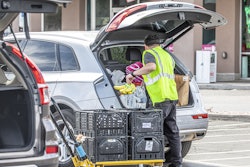
The supply chain is going to be a deciding issue in the 2022 mid-term election, and voters in key states such as Arizona, Georgia, Nevada and New Hampshire, expect their elected officials to act on solutions to prevent the next supply chain crisis, according to a new study by the Consumer Brands Association (CBA).
“Once invisible to consumers, the pandemic and holiday shipping crunch have unmasked the supply chain and made it kitchen table conversation,” says Geoff Freeman, president and CEO of CBA. “Voters have exhausted their patience with years of government inaction, and elected officials can’t afford to lose sight of the supply chain after New Year’s Day.”
“There has been significant attention on the ports in recent months, offering a playbook for how government can play a role in easing supply chain pressure,” adds Freeman. “However, too much focus on one link in the chain only serves to relocate bottlenecks, not solve problems.”
From Consumer Brands Association:
- Consumers everywhere are experiencing challenges with product shortages due to supply chain slowdowns. Across all four states, a majority of voters say that supply chain issues have had a major or big impact on their ability to get products they need and still more have experienced shortages in grocery stores.
- When asked about their likelihood of voting for candidates who support key solutions to remove supply chain bottlenecks, voters in all four states offered majority support for every solution.
- Nearly seven in 10 (69%) of voters in Arizona and Georgia, respectively, are more likely to back candidates who support options to increase trucking capacity.
“Elected leaders have an opportunity to act on the supply chain’s lessons or face challenges at the ballot box,” Freeman says. “Weathering this crisis is difficult enough; we shouldn’t have to confront a future crisis that forces consumers to question why their representatives didn’t do more when they had the chance.”



















